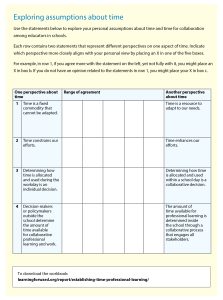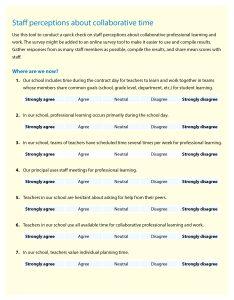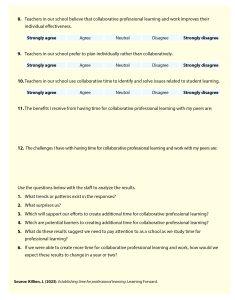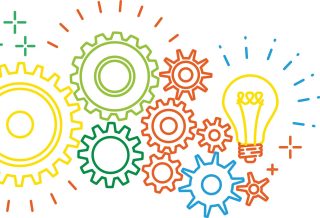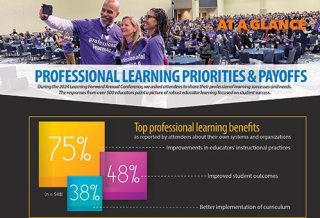TOOLS
Explore how you use time — and find ways to improve it
By Joellen Killion
Categories: Change management, Data, Facilitation, Improvement science/networksAugust 2023
Ask any educator what the major challenge is in providing effective professional learning and the answer is the probably the same: time. Many schools and districts, nevertheless, find ways to create schedules that provide regular, frequent opportunities for teacher collaboration and collaborative professional learning.
Learning Forward’s workbook, Establishing Time for Professional Learning, which can be found on the Learning Forward website, is a tried-and-true resource that guides districts and schools to develop, vet, and implement recommendations for increasing collaborative learning time for educators, and then evaluate the effectiveness of the change. The workbook is grounded in a rich set of tools.
Here we share two of those tools to kick-start your efforts to study how you use learning time and make needed changes. They are designed to surface beliefs about time because understanding personal assumptions provides fundamental information for teams as they discover how they are currently using time, make meaning of those findings, and make and implement new plans. These two tools can be used alone or in combination with the rest of the workbook.
Suggestions for use
- Ask team members to independently complete the first tool, Exploring Assumptions About Time. It presents some contradictory positions about time and asks each person to identify where their beliefs fall along a spectrum. Provide time for individual reflection and possibly a pair-share discussion.
- Use the second tool, Staff Perceptions About Collaborative Time, to conduct a quick check on staff perceptions about collaborative professional learning. Gather responses from as many staff members as possible. Compile the results and share mean scores with staff.
- Facilitate a team discussion about individuals’ and the team’s beliefs about collaborative professional learning time, using the six questions at the end of the second tool as a guide or inspiration. Consider how the group’s beliefs align with the current approach to collaborative learning time and whether any changes might be needed.
- For further exploration, use the full workbook, Establishing Time for Professional Learning, to create a time study team and engage in a deeper dive into time use in your system.
Download pdf here.

Joellen Killion is a senior advisor to Learning Forward and a sought-after speaker and facilitator who is an expert in linking professional learning and student learning. She has extensive experience in planning, design, implementation, and evaluation of high-quality, standards-based professional learning at the school, system, and state/provincial levels. She is the author of many books including Assessing Impact, Coaching Matters, Taking the Lead, and The Feedback Process. Her latest evaluation articles for The Learning Professional are “7 reasons to evaluate professional learning” and “Is your professional learning working? 8 steps to find out.”
Categories: Change management, Data, Facilitation, Improvement science/networks
Recent Issues
LEARNING DESIGNS
February 2025
How we learn influences what we learn. This issue shares essential...
BUILDING BRIDGES
December 2024
Students benefit when educators bridge the continuum of professional...
CURRICULUM-BASED PROFESSIONAL LEARNING
October 2024
High-quality curriculum requires skilled educators to put it into...
LEARNING TO PIVOT
August 2024
Sometimes new information and situations call for major change. This issue...



